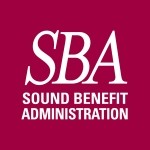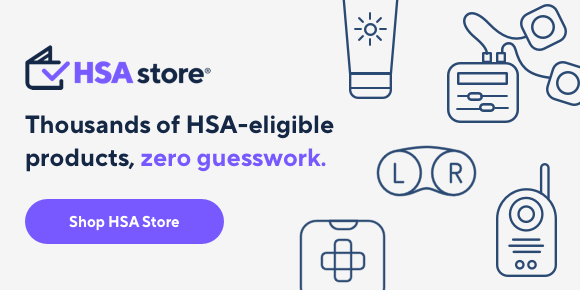Health Savings Account (HSA)
What is an HSA?
HSA’s are individual savings accounts that pay for qualified health care expenses tax-free. To open an HSA, you must be enrolled in a qualifying high deductible health plan (HDHP). You decide how much you want to contribute to the plan each year up to a limit set by the IRS.
How does it benefit me?
- Reduces your insurance premiums and increases your take-home pay by decreasing taxes.
- Rolls over from year-to-year and stays with you even if you change employers.
- Earns interest tax-free.
- Pays for eligible health care expenses with an HSA debit card.
What else do I need to know?
- You must keep proper documentation of eligible expenses, like an Explanation of Benefits statement from your insurance company or receipt for over-the-counter medications.
- Ineligible withdrawals are subject to a 20% penalty tax.
- Once you have an account, you can stop, re-start or change your contribution amount at any time.
Frequently Asked Questions
I’m worried about the COVID-19 pandemic. Can I buy disposable face masks as an eligible expense through my HSA or FSA?
Yes, when purchased because there is a current respiratory epidemic or you have a family member who is sick with a communicable illness, a disposable mask is eligible for reimbursement from your HSA or FSA.
What are the HSA Eligibility Guidelines?
You must be enrolled in a qualified High-Deductible Health Plan (HDHP). You cannot be claimed as a Tax Dependent.
You cannot be enrolled in Medicare, Tricare, another group medical plan (your spouse’s plan, for example), a Health Flexible Spending Account, or a Health Reimbursement Arrangement.
Domestic Partners of the account holder must set up a separate account and may contribute up to the family limit; the account holder cannot use their account to pay a Domestic Partner’s expenses.
If unsure about your eligibility, please consult your tax advisor or IRS publication 969.
How should I store my HSA eligible expense records?
All participants are responsible for retaining the proper documentation to verify the eligibility of a distribution. You can maintain these records yourself, or you can use the ClaimsVault™ feature of your HSA account to conveniently keep copies of your documentation.
How do I store HSA claims in the ClaimsVault™?
Click on the link for ClaimsVault™ in the top menu bar once you’ve logged into your HSAToday account, and choose “Add an Expense.” From there you can enter details about your qualified expense, and choose to either:
1. Upload a scanned copy of your documentation.
2. Download our mobile phone app (or search for DataPath Summit) at Google Play Store for Android products and iTunes for Apple products. Use the app to take pictures of your claims receipts, then upload directly to the ClaimsVault™.
3. Fax it in with a provided cover sheet.
What happens if I pay for expenses that aren’t eligible?
Ineligible withdrawals are subject to income tax plus an additional 20% tax unless the account holder is 65 or older, is disabled or deceased.
Note: Per IRS requirements, you should always keep your receipts on file for any purchases made with your HSA card.
How do I set up an HSA?
Click here to enroll now. This is a secure website so all the information you enter will be protected.
Follow the prompts to set up your new HSA.
How much can I spend each year in my HSA?
You can withdraw up to the amount in your account at that point in time. Any unused funds roll over from year to year.
What expenses are considered eligible for HSA or FSA reimbursement?
You can use a HSA/FSA to pay for many medical, dental and vision expenses tax-free. Click here to see what expenses are eligible.
What is the HSA ClaimsVault™?
The ClaimsVault™ offers you and electronic way to manage your claims. You can use the ClaimsVault™ to store documentation for purchases made with your HSA card, and for HSA distributions you have taken to reimburse yourself for qualified expenses paid out-of-pocket. You can also use the ClaimsVault™ to keep documentation for qualified expenses that you have paid out-of-pocket, and for which you have not yet taken a distribution, so that your invested funds can continue to earn interest.
What can my HSA account be invested in?
If your account balance is at least $1,000, you can begin investing in four carefully selected investment portfolios based on risk or create a custom portfolio of your own from a menu of mutual funds for an additional monthly fee. A self-assessment tool helps you decide which investment option is best for you. Advisor-selected funds include Exchange Traded Funds, target-date funds and index funds. Online research materials for each model and fund, such as investment prospectus and detailed investor statements, are available. You can self-direct your investments with online tools to buy, sell, transfer and rebalance your portfolio.
If I set aside part of my pay for an FSA or HSA, won’t I make less money?
No. Your net take-home pay will increase by the amount of taxes you did not pay.
Do I need to file any tax forms for my HSA?
All participants must file an IRS Form-8889, which we provide to you, with their taxes.
What does it cost me to have an HSA?
The HSA incurs a monthly fee of $3.00. If your employer is paying the fee and you terminate employment, the monthly fee will be taken from your HSA balance following termination.
The HSA may be required to maintain a minimum balance of $10. If the balance falls below this minimum, your account may be closed and applicable account closing fees will apply. Please contact Sound Benefit Administration if you have questions.
How do I access my HSA account?
To log in and manage your account after it is set up, login in here.
Once logged in, you can manage your investments, store claim documentation in the ClaimsVault™, initialize a withdrawal, retrieve your year-end tax information, view your recent transactions, and more.
Am I limited to the amount I can contribute in my HSA?
IRS limits for 2019 are $3,500 per year if you have Employee Only coverage, or $7,000 for Family coverage. If aged 55 or older, you can also make “catch-up” contributions of up to $1,000 per year above those limits.
Once you have an account, you can stop, re-start or change your contribution amount at any time.
Contribution limits assume the account holder is “eligible” for the entire tax year. If the account holder is not eligible for the entire tax year they can still contribute the maximum as long as they remain eligible for the entire following tax year (through December 31); otherwise, they will be taxed like normal with an additional 10% penalty on a prorated amount of the contribution.
Contributions can be made up to the day federal income taxes are due for the previous plan year.
Who is a legal dependent?
A legal dependent is classified as your spouse, your child(ren), your adopted child(ren), or anyone else you are legally responsible for. For federally-regulated IRS employee benefit plans incurred by domestic partners and/or their children (not your biological children) are not eligible for reimbursement under this plan. You may not submit charges incurred by anyone other than yourself, your spouse, or your children, otherwise known as your legal dependents.
Can Sound Benefit Administration pay a provider directly?
No. You pay providers directly and are reimbursed for those eligible expenses.

